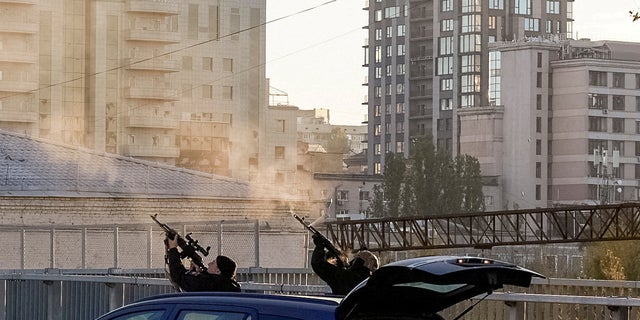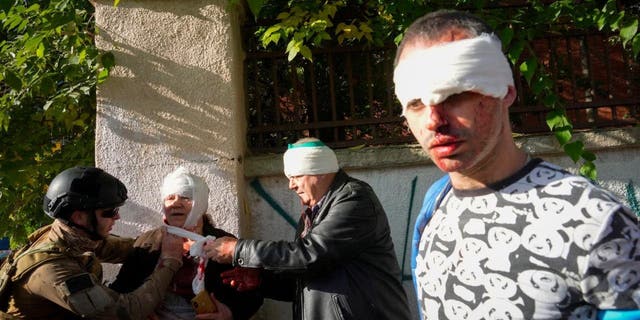Zelenskyy says Russia is ‘probably’ paying for Iranian drones with nuclear research assistance
Russia is “probably” paying for Iranian kamikaze drones by assisting Iran’s nuclear research programs, Ukrainian President Volodymyr Zelenskyy said Monday.
Zelenskyy made the statement during an address to the Haaretz Democracy Conference on Monday, saying Russia has purchased at least 2,000 Shahed-136 drones and has used them to bombard Ukraine. Iranian instructors have been spotted in Belarus teaching Russian forces to coordinate drone strikes with the Iranian-made drone system, leading to further fears that Belarus’ role in the conflict in Ukraine may soon escalate.
“Russia has used almost 4,500 missiles against us, and their stock of missiles is dwindling,” Zelenskyy said. “That is why Russia went looking for affordable weapons in other countries to continue terror. It found them in Iran.”
“I have a question for you–How does Russia pay Iran for this, in your opinion? Is Iran just interested in money?” Zelenskyy continued. “Probably not money at all, but Russian assistance to the Iranian nuclear program. Probably, this is the exact meaning of their alliance.”
WHITE HOUSE ACCUSES IRAN OF GIFTING ‘SEVERAL HUNDRED’ DRONES TO RUSSIA

Zelenskyy went on to call on Israel to send assistance to Ukraine in the form of air defense systems. He said Ukraine has been asking for such support since 2014 and suggested that Russia would not be in its current alliance with Iran if Ukraine had had a robust air defense system like the Iron Dome at the outset of the conflict.
Putin’s military has shifted toward a strategy of using missiles and drone attacks to destroy Ukraine’s power and water infrastructure in recent weeks. Zelenskyy announced that Russian attacks had destroyed nearly a third of Ukraine’s power stations earlier in October.
Putin began escalating attacks on Ukrainian infrastructure in early October after the bombing of the Kerch Bridge, which connects Russia to Crimea. Russian forces first opened up with an hours-long barrage of missiles and Iranian kamikaze drones on more than a dozen Ukrainian cities on October 10.
RUSSIA TARGETED UKRAINE’S ‘INFRASTRUCTURE AND PEOPLE’ WITH HOURS-LONG BARRAGE SIGNALING ESCALATION FROM PUTIN
Ukrainian Defense Minister Oleksii Reznikov condemned the attacks as war crimes and called on Western countries to supply more air-defense systems to Ukraine.
“Our enemy believes that missile strikes are effective means of intimidation. They are not. They are war crimes,” Reznikov wrote at the time. “Civilians are dying and getting injured. Ukraine, with the support of the civilized world, must bring the missile terrorists to justice. And [we] will do it.”

The Russian air force is also conducting routine patrols over Belarusian airspace after President Alexander Lukashenko claimed the country was at threat from a Ukrainian invasion. Belarus has allowed Russian troops to travel through and operate within its borders since Russian President Vladimir Putin began his invasion of Ukraine in February, but the number of troops deployed there has increased in recent weeks.
Belarus presents an ideal location for launching drone strikes against Ukraine, as the border between the two countries lies just 60 miles from the capital of Kyiv at its closest point.
Lukashenko claimed last week that Ukraine posed a threat of drone and missile strikes to Belarus, leading Russia to increase its deployment in the country to 9,000 troops and begin regular air patrols.
While Russian and Belarusian forces have participated in joint military drills throughout the invasion of Ukraine, Belarusian forces have not yet participated in any offensive.
Reuters contributed to this report.
Read the full article Here


